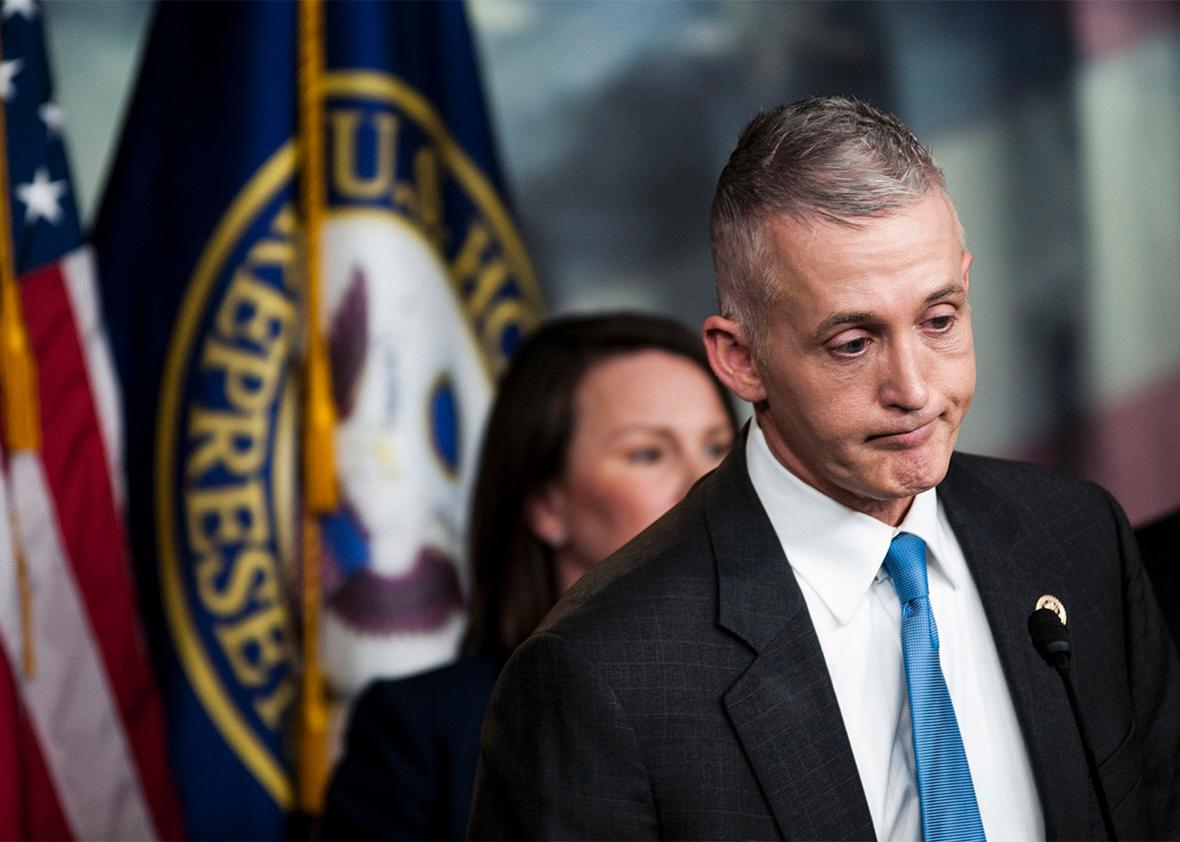Democrats have never trusted the House investigation of Benghazi. “It’s a tremendous red herring and a waste of taxpayer resources,” said House Intelligence Committee member Adam Schiff, after Speaker John Boehner announced he would establish a special committee to investigate the attack. They believed it was a farce—a glorified venue for opposition research against former Secretary of State Hillary Clinton. To that point, earlier this summer, Rep. Elijah Cummings—the ranking Democrat on the committee—accused Republicans of leaking “doctored information to the press in order to make unsubstantiated allegations against Secretary Clinton.”
Republicans have consistently denied that this is a partisan fishing expedition. “My interest is in the past, not the future. I’m trying to figure out what happened to four Americans in Benghazi,“ said South Carolina Republican Rep. Trey Gowdy, who leads the committee, in reply to further criticism from Cummings. But it’s not hard to understand Democratic frustration. Three separate investigations—from the Senate Committee on Homeland Security and Governmental Affairs, from the House Select Committee on Intelligence, and from the Senate Select Committee—cleared Clinton and the State Department of particular wrongdoing. There were no warnings and there was no cover-up. At most, the agency and its leaders were negligent in the face of danger.
Despite this, Republicans pressed ahead. In the 17 months since the committee was formed, investigators haven’t found anything to contradict earlier assessments. Then, as now, there’s no evidence of a cover-up from Clinton or the administration.
Still, in pursuing leads—and asking the State Department for Clinton’s correspondence—they brought Clinton’s private email server to light, plunging the Democratic presidential candidate into an ongoing controversy over transparency and security. It was a perfect victory. On one hand, Republicans could deny—plausibly, if not believably—that the committee wasn’t about Clinton at all, and that this was an unintended consequence of the investigation. On the other, Clinton’s email scandal had all but dwarfed her campaign and its message.
But that was before Boehner announced his retirement, and before his assumed successor—House Majority Leader Kevin McCarthy—said too much about the actual purpose of the committee. “Everybody thought Hillary Clinton was unbeatable,” McCarthy said to Fox News’ Sean Hannity. “But we put together a Benghazi special committee, a select committee. What are her numbers today? Her numbers are dropping.”
This connection—between the committee, the email scandal, and Clinton’s declining numbers—was debatable. But the words were there: The committee wasn’t about finding the truth behind the attack in Benghazi; it was about tanking Clinton ahead of the election. McCarthy’s comments helped kill his bid for House speaker and prompted new attacks from the Clinton campaign, which released a national ad slamming House Republicans. “Republicans finally admit it,” said the ad, “Republicans have spent millions attacking Hillary because she’s fighting for everything they oppose.”
This weekend, another shoe dropped for the Benghazi committee. “A former investigator for the House Select Committee on Benghazi says he was unlawfully fired in part because he sought to conduct a comprehensive probe into deadly attacks on the U.S. compound instead of focusing on Hillary Rodham Clinton and the State Department,” reported the Associated Press.
The New York Times followed with a major story that detailed the degree to which “the focus of the committee’s work has shifted from the circumstances surrounding the Benghazi attack to the politically charged issue of Mrs. Clinton’s use of a private email server while she was secretary of state.” What’s more, according to the Times, this was a particular preoccupation for Boehner, who pushed the committee to focus on Clinton’s emails.
[Gowdy] said that at one point this spring he told John A. Boehner, the House speaker, that he feared the task of investigating the email issue would distract from his committee’s work…[and] pressed Mr. Boehner to have another House committee examine the matter of Mrs. Clinton’s emails, but that Mr. Boehner had rejected the request.
… Senior Republican officials, who spoke on the condition of anonymity because they were discussing confidential conversations, said that Mr. Boehner had long been suspicious of the administration’s handling of the attacks and that Mrs. Clinton’s emails gave him a way to keep the issue alive and to cause political problems for her campaign. But he thought that the task was too delicate to entrust to others and that it should remain with Mr. Gowdy, the former prosecutor.
At this point, the House Select Committee on Benghazi is a dead letter. Democrats will dismiss it entirely, Hillary Clinton—in her upcoming testimony—will likely treat it with contempt, and the media will disregard its claims. Indeed, there’s a chance this could spread beyond the committee to Clinton’s email controversy.
For all the noise over her server, there’s been no evidence of wrongdoing or legal misconduct in Clinton’s emails. And President Obama has challenged the idea that Clinton harmed national security by using a private system. Barring genuine revelations, the collapse of the Benghazi committee might create skepticism around future email releases. In other words, it could kill the story or at least make it less critical to Clinton coverage.
For months, the Benghazi Committee was the sharpest tool in the GOP’s fight against Hillary Clinton. Now, thanks to missteps (and a little hubris), it’s almost dull beyond use.
